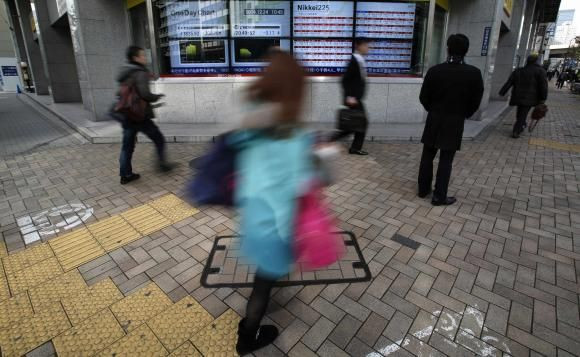Asian Shares Wilt As Worry Over Greece Saps Risk Appetite

(Reuters) - Asian shares got off to a lacklustre start on Tuesday, as a sharp selloff in commodities and political uncertainty inGreece made investors less willing to take risks in the final trading days of 2014.
Activity was thin ahead of the New Year holiday, with many traders having closed out positions. Japanese markets will be shut from Wednesday to Friday, reopening next Monday.
MSCI's broadest index of Asia-Pacific shares outside Japan.MIAPJ0000PUS edged down about 0.2 percent, while Japan'sNikkei stock average .N225 fell 0.7 percent.
On Wall Street overnight, the Dow Jones industrial average .DJIended slightly down, while the S&P 500 .SPX and the NasdaqComposite .IXIC managed to eke out modest gains.
Greek Prime Minister Antonis Samaras failed to get enough support for his presidential nominee on Monday, and will call a national election for Jan. 25.
The news caused Greek shares .ATG to plunge as much as 11.3 percent before closing down 3.9 percent, and yields on 10-year Greek bonds GR10YT=RR touched their highest since September 2013.
The election could open the way for Greece's Syriza party to come to power. That party says it wants to wipe out a big part of the country's debt and cancel the terms of the bailout Athens received from the European Union and International Monetary Fund.
Developments in Greece weighed on the euro overnight, which dropped as low as $1.2143EUR= on the EBS trading platform, its lowest since August 2012. It was last steady on the day at $1.2154.
"Our bearish view on EUR/USD rests on the assumption that monetary policy settings on both sides of the Atlantic are likely to diverge markedly next year," strategists at UBS wrote in a note to clients.
"That remains the case, but now we believe the return of political uncertainty to Greececould trigger an acceleration of the euro's downtrend over the next two months," UBS said.
Solid recent U.S. data has reinforced the view that the U.S. economy is improving enough for the Federal Reserve to consider ending its near-zero interest-rate policy in mid-2015. That would be in contrast to the still-sluggish economies of the euro zone and Japan, where central bankers are likely to continue monetary easing.
Against its Japanese counterpart, the dollar was steady on the day at 120.65 yen JPY=, not far from a 7-1/2 year high of 121.84 hit earlier this month.
The dollar's general strength continued to pressure commodities, which are priced in dollars and therefore become more expensive and less appealing to holders of weaker currencies.
Copper CMCU3 fell to its lowest level in four and a half years on concerns about a strong dollar and a slowdown in China. U.S. oil CLc1 rose up about 0.2 percent to $53.70 a barrel after shedding 1.9 percent in Monday.
© Copyright IBTimes 2024. All rights reserved.



















